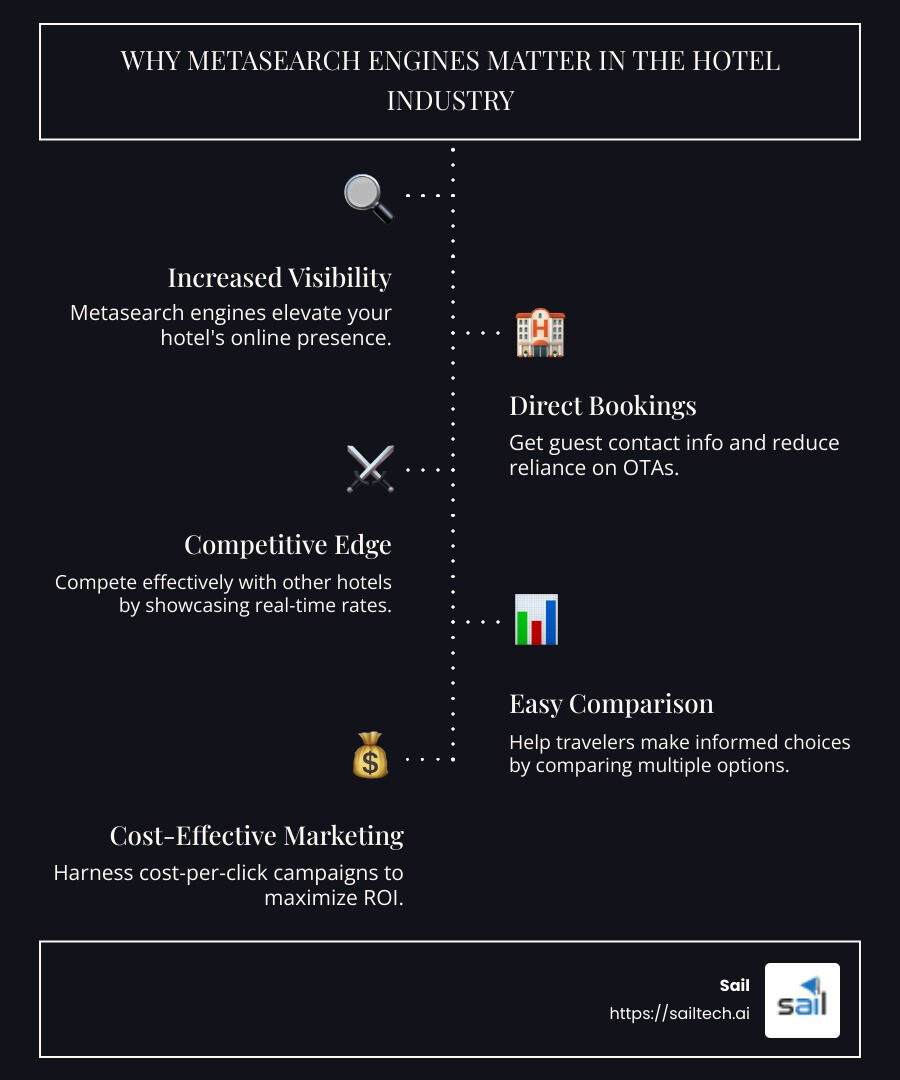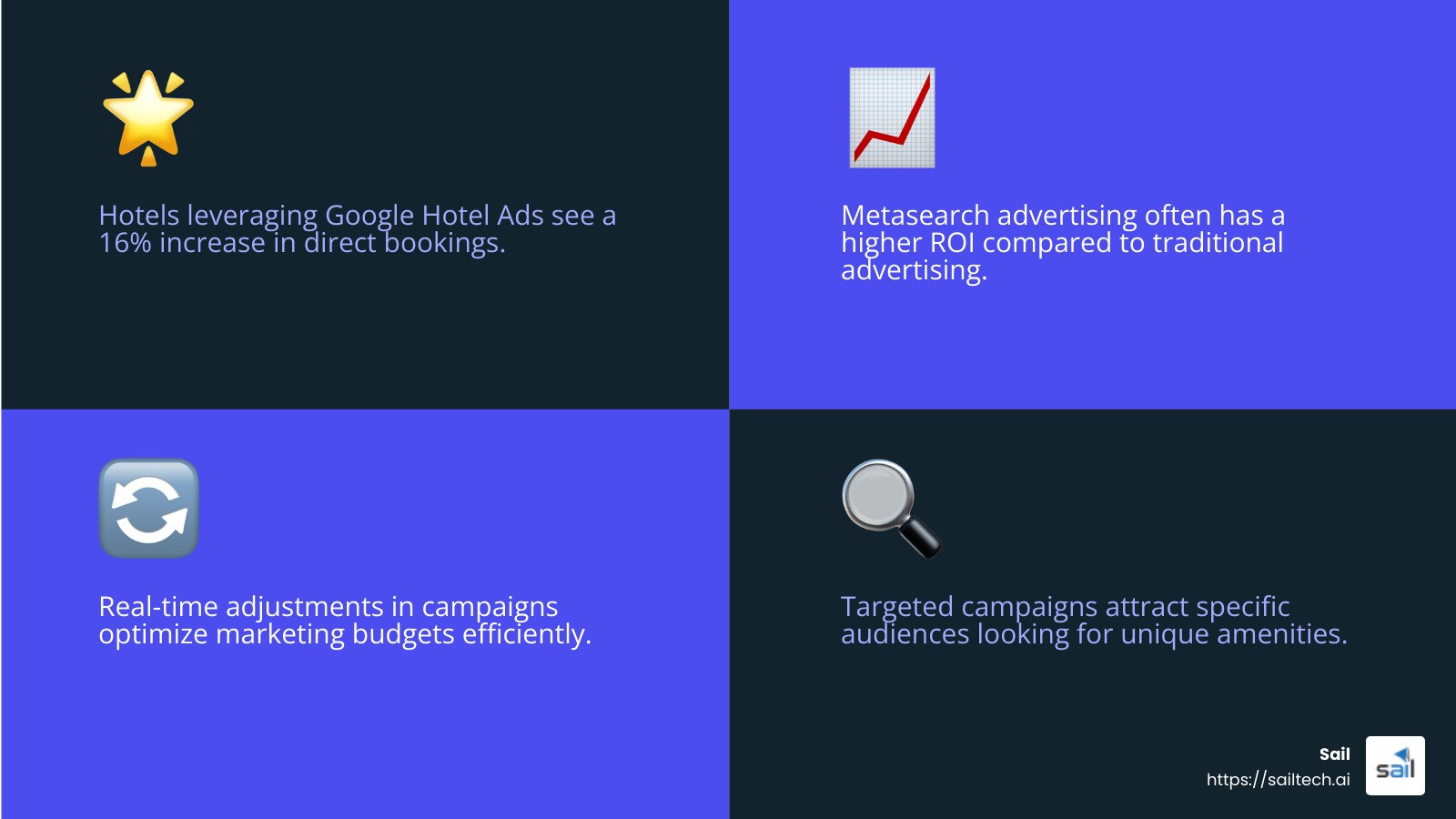Blogs /
Direct Bookings & Conversion
As travel demand evolves, hotel marketing is no longer just about visibility—it’s about being discovered where booking decisions are made. This report explores how search, social, and AI are reshaping guest acquisition.
Why Metasearch Engines Matter in the Hotel Industry
If you're looking for a simple way to compare hotel prices and boost direct bookings, metasearch for hotels is the answer. These powerful tools aggregate rates and availability from multiple sources, helping travelers find the best deals and making your property more visible. Here’s a quick overview:
Increased Visibility: Metasearch engines lift your hotel's online presence.
Direct Bookings: Get guest contact info and reduce reliance on OTAs.
Competitive Edge: Compete effectively with other hotels by showcasing real-time rates.
Easy Comparison: Help travelers make informed choices by comparing multiple options.
Cost-Effective Marketing: Harness cost-per-click campaigns to maximize ROI.
Metasearch engines are reshaping the hotel industry by simplifying the booking process and driving digital marketing efforts. According to an Eye for Travel survey, a whopping 94% of travelers use these platforms to compare hotel rates.
I'm Shahar Rubin, founder and CEO of Sail, and I've harnessed AI to revolutionize hotel marketing. My background in tech and entrepreneurship has allowed me to reduce costs and boost direct bookings for hotels like yours. Let's dive deeper into how metasearch engines can transform your hotel's digital marketing strategies.

What is a Metasearch Engine?
How Metasearch Engines Work
A metasearch engine is a powerful tool that helps travelers compare hotel prices and availability across multiple booking platforms in one place. But how exactly does it work?
Definition and Functionality
Metasearch engines operate by sending search queries to various search engines and booking sites, aggregating the results into a single, ranked list. This allows users to see all their options at a glance, making it easier to find the best deal.
Search Queries and Aggregation
When a traveler searches for a hotel in a specific destination or for certain dates, the metasearch engine queries multiple sources—like Google, TripAdvisor, and others—simultaneously. It then aggregates the results, displaying room rates, availability, and other essential details from various booking sites.
Ranked List
The results are typically presented in a ranked list, sorted by factors like price, relevance, and user reviews. This helps travelers quickly identify the best options that meet their criteria.
Inventory, Rates, and Availability
What makes metasearch engines so useful is their ability to pull inventory, rates, and availability from multiple booking platforms. This comprehensive view allows travelers to make informed decisions without having to visit multiple websites.
For example, a search for "hotels in Sydney" might return results from Booking.com, Expedia, and the hotel's own website, all in one place. This not only saves time but also increases the chances of finding the best deal.
Benefits for Hotels
For hotels, being featured on metasearch engines means higher visibility and more direct bookings. Since travelers can see your hotel alongside competitors, it's crucial to have accurate pricing and availability to attract bookings.
Bidding and Advertising
Hotels can also bid for ad placements on metasearch engines. For instance, a hotel might bid on the keyword "Sydney hotel" to appear at the top of the search results. This involves a cost-per-click (CPC) model, where the hotel pays each time a user clicks on their listing.

Simplified Booking Process
Metasearch engines simplify the booking process by allowing travelers to compare options and book almost simultaneously. This seamless experience reduces the chances of abandoned bookings and encourages impulse purchases.
Real-Time Data
One of the key advantages is the real-time data provided by metasearch engines. Travelers can see up-to-date room rates, availability, and even guest reviews and photos, all in one place.
Conclusion
In summary, metasearch engines streamline the process of finding and booking hotels by aggregating data from multiple sources. This not only benefits travelers but also helps hotels increase visibility and direct bookings.
Next, let's explore the specific benefits of metasearch engines for hotels in more detail.
Benefits of Metasearch for Hotels
Improved Guest Experience
Being listed on metasearch engines like Google Hotel Ads, TripAdvisor, and Trivago significantly boosts your hotel's visibility. When travelers search for accommodations, your hotel appears alongside major competitors, increasing the chances of capturing potential guests' attention.
Direct Bookings
Metasearch platforms are designed to drive direct bookings. Unlike OTAs, which often keep guest contact information, metasearch engines redirect travelers to your hotel’s website to complete their reservations. This gives you direct access to your guests, allowing you to build relationships and encourage repeat visits.
Impulse Purchases and Reduced Abandoned Bookings
The seamless booking process offered by metasearch engines encourages impulse purchases. Travelers can easily compare options and complete their bookings in just a few clicks, reducing the likelihood of abandoned bookings. This streamlined experience is crucial for capturing high-intent travelers who are ready to make a reservation.
Seamless Booking and Real-Time Data
Metasearch engines provide real-time data on room rates, availability, guest reviews, and photos. This comprehensive information helps travelers make informed decisions quickly. For example, seeing up-to-date rates and positive reviews in one place can tip the scales in your favor, leading to more bookings.
Marketing and Distribution
Advertising and Bidding
Hotels can bid for ad placements on metasearch platforms to appear at the top of search results. This involves various models like cost-per-click (CPC), cost-per-action (CPA), and cost-per-impression (CPI). For instance, a hotel might bid on the keyword "luxury hotel in Paris" to ensure it appears prominently when travelers search for accommodations in that area.
Cost-Effective Marketing
Metasearch advertising can be more cost-effective than traditional advertising or OTA commissions. With a pay-per-click model, you only pay when a user clicks on your listing, giving you more control over your budget. This often results in a higher return on investment (ROI) and allows you to allocate your marketing dollars more efficiently.
Targeted Campaigns
Using metasearch engines, you can run targeted campaigns to reach specific audiences. For instance, you can focus on travelers searching for last-minute deals or those looking for specific amenities like a spa or golf course. This targeted approach helps you maximize your marketing efforts and attract the right guests.
Real-Time Adjustments
One of the key benefits of metasearch advertising is the ability to make real-time adjustments to your campaigns. You can monitor performance metrics, such as click-through rates and conversions, and tweak your bidding strategy accordingly. This flexibility ensures that you get the most out of your advertising budget.
Guest Reviews and Photos
Metasearch engines often display guest reviews and photos, which play a crucial role in the decision-making process. Positive reviews and high-quality images can significantly boost your hotel's appeal. Make sure your listings are updated with the best possible content to attract more bookings.
Amenities and Detailed Listings
Detailed listings that highlight your hotel's amenities can set you apart from the competition. Features like free Wi-Fi, breakfast options, and room upgrades can be the deciding factor for many travelers. Ensure that your metasearch listings are comprehensive and highlight all the unique selling points of your property.

By leveraging metasearch engines effectively, hotels can significantly boost their visibility, attract more direct bookings, and improve overall guest satisfaction. This powerful tool not only improves your marketing efforts but also provides a seamless booking experience for travelers.
Next, let's dig into the top metasearch engines for hotels and how you can optimize your presence on these platforms.
Top Metasearch Engines for Hotels
When it comes to metasearch for hotels, choosing the right platform can make a huge difference in your visibility and bookings. Let’s explore how you can optimize your presence on these platforms without specifying particular services.
By leveraging metasearch engines effectively, your hotel can reach a broader audience, attract direct bookings, and improve your marketing efforts. Each platform offers unique features that cater to different aspects of the booking process, so choose the ones that align best with your goals.
Next, let’s explore how to optimize your hotel’s presence on these metasearch engines.
How to Optimize Your Hotel's Presence on Metasearch Engines
Optimizing your presence on metasearch engines is crucial for increasing visibility and direct bookings. Here’s how to make the most of your metasearch strategy.
Choosing the Right Metasearch Channels
Not all metasearch engines are created equal. Some are better for accommodation-only searches, while others combine various travel services. Prioritize your channels based on your target audience and goals.
Key Considerations:
Accommodation-Only Platforms: Focus on sites like Trivago and Google Hotel Ads if you want to target travelers specifically looking for hotels.
Combined Platforms: Use Kayak or Bing if you want to appear in searches that include flights and car rentals.
Prioritization: Start with the most popular platforms like Google and TripAdvisor, then expand to others as you refine your strategy.
Maintaining Rate Integrity
Rate parity ensures that your prices are consistent across all platforms. This builds trust with potential guests and avoids confusion.
Best Practices:
Competitive Pricing: Regularly compare your rates with those of competitors and OTAs to stay competitive.
Real-Time Updates: Use a reliable Property Management System (PMS) or Central Reservation System (CRS) to keep your rates updated across all channels.
Using Reliable PMS or CRS Providers
A good PMS or CRS can connect you to major metasearch engines and help you manage your channels effectively.
Advantages:
Connectivity: Seamlessly integrate with metasearch platforms to ensure accurate and real-time data.
Performance Metrics: Track key metrics like occupancy rates and Average Daily Rate (ADR) to optimize your strategy.
Channel Management: Know which channels perform best and which are costing you money.
Fine-Tuning Your Strategy
Optimizing your metasearch strategy requires ongoing adjustments and monitoring.
Steps to Follow:
Bidding: Experiment with different cost-per-click (CPC) rates to find what works best within your budget.
Conversion Rate: Monitor your conversion rates and adjust your strategy to improve them.
Budget Management: Regularly review your budget to ensure your campaigns are sustainable.
Setting Different Strategies for Different Sites
Each metasearch engine operates differently, so a one-size-fits-all approach won’t work.
Custom Tactics:
Site-Specific Tactics: For example, set a lower CPC on TripAdvisor if you notice a lot of clicks but low conversions.
Traffic Analysis: Use tools like Google Analytics to track traffic and conversion rates from each platform.
Cost Management: Adjust your spending based on the performance of each channel.
By following these steps, you can optimize your hotel’s presence on metasearch engines, increase direct bookings, and improve your overall marketing strategy. Next, let’s dive into some frequently asked questions about metasearch for hotels.
Frequently Asked Questions about Metasearch for Hotels
What is a hotel metasearch?
A hotel metasearch engine is a platform that aggregates data from multiple booking sites, allowing travelers to compare hotel prices and availability in one place. It sends search requests to various search engines and displays a consolidated list of results. This makes it easier for users to find the best deals and book directly.
How does metasearch benefit hotels?
Metasearch engines offer several benefits to hotels:
Increased visibility: Your hotel appears on multiple booking platforms, reaching a wider audience.
Direct bookings: Travelers can book directly from your hotel's website, reducing reliance on Online Travel Agents (OTAs) and saving on commission fees.
Impulse purchases: The convenience of comparing prices and booking immediately increases the chances of impulse bookings.
Reduced abandoned bookings: A seamless and straightforward booking process lowers the likelihood of potential guests abandoning their reservations.
What are the top metasearch engines for hotels?
Several metasearch engines are popular in the hotel industry:
Google Hotel Ads: Known for high conversion rates, it integrates with Google Search and Maps, offering free booking links and "Book on Google" features.
TripAdvisor: Offers tools like TripConnect and Sponsored Placements, which help improve your hotel's visibility and direct booking potential.
Trivago: Provides options like Business Studio and Express Booking, allowing hotels to manage their listings and bookings efficiently.
Kayak: Combines hotel searches with flights and car rentals, attracting a broader range of travelers.
Bing: Similar to Google, Bing's metasearch capabilities include hotel listings and price comparisons, though it may have a smaller user base.
By leveraging these metasearch engines, hotels can improve their online presence, attract more direct bookings, and ultimately increase revenue.
Conclusion
Metasearch engines are a game-changer for the hotel industry. They provide a powerful way to increase visibility and secure more direct bookings. But managing metasearch campaigns can be complex and time-consuming. That's where we come in.
Sail offers a unique, AI-driven marketing solution designed specifically for hotels. Our approach is simple and risk-free. We cover all your ad spend and charge only for the bookings we generate. This means you can focus on what you do best—providing excellent service to your guests—while we handle the technical details of your marketing campaigns.
By featuring your hotel on essential channels like Instagram, Google, and metasearch platforms, we ensure your property achieves maximum visibility. Our AI technology continuously optimizes your campaigns, driving higher booking rates and increased revenue.
Increased Visibility: Sail ensures your hotel is seen by the right people at the right time. Our targeted campaigns on platforms like Instagram and Google capture the attention of potential guests, making your hotel stand out in a crowded marketplace.
Direct Bookings: With Sail, you don't just get more traffic; you get more bookings directly from your website. This reduces your reliance on OTAs and saves you money on commission fees.
Risk-Free Model: Our pricing model is straightforward and cost-effective. You only pay for the successful bookings we generate, with no setup fees or long-term commitments. This makes it easy for you to test our services without financial risk.
In summary, Sail provides an effective, low-risk solution to boost your hotel's visibility and direct bookings. Partner with us to take the guesswork out of your digital marketing and open up the full potential of metasearch for hotels.
Ready to see the results for yourself? Contact us to get started.
Share:
20 years of hospitality lessons. No fluff. No spam
Join 500+ hospitality pros getting our best growth playbooks.
© 2026 Sail. All rights reserved.

